ZGCTA Activities
2025 Global High-Level Think Tank Forum for Science and Technology Innovation was Successfully Held
Date:2025-03-30 12:27
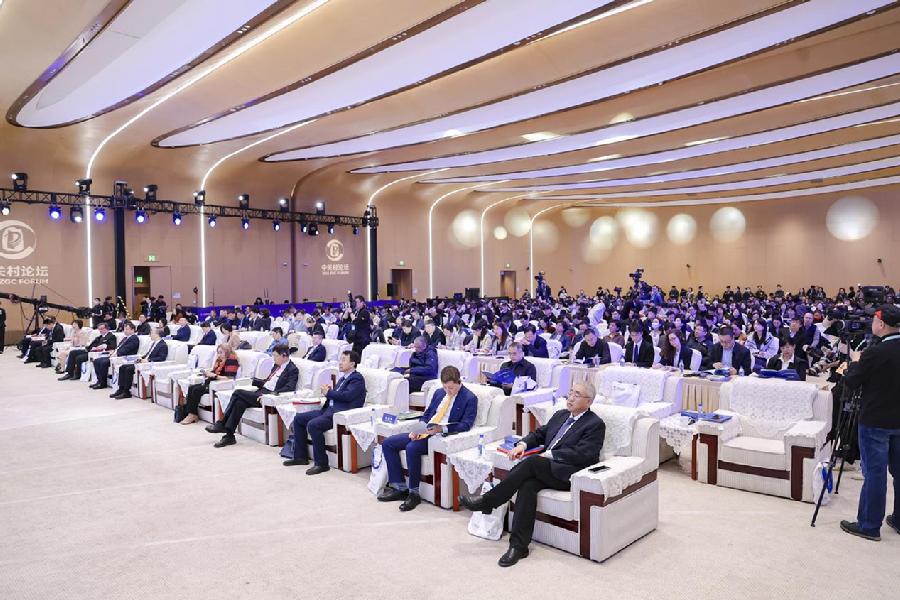
On-site photo
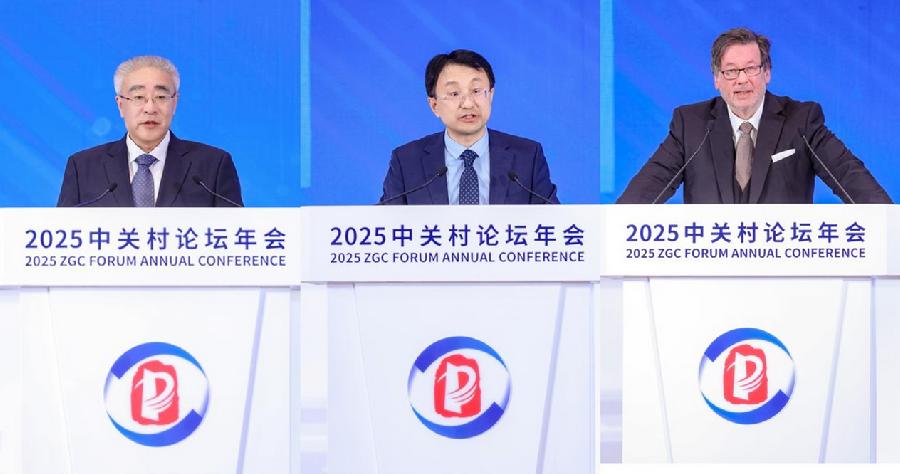
Speech Session
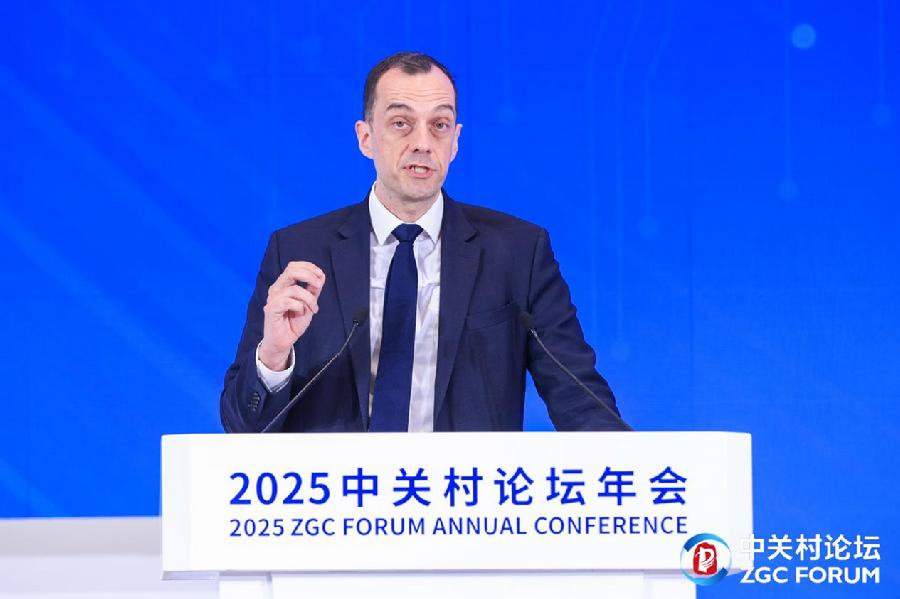
Diplomat’s Speech Session
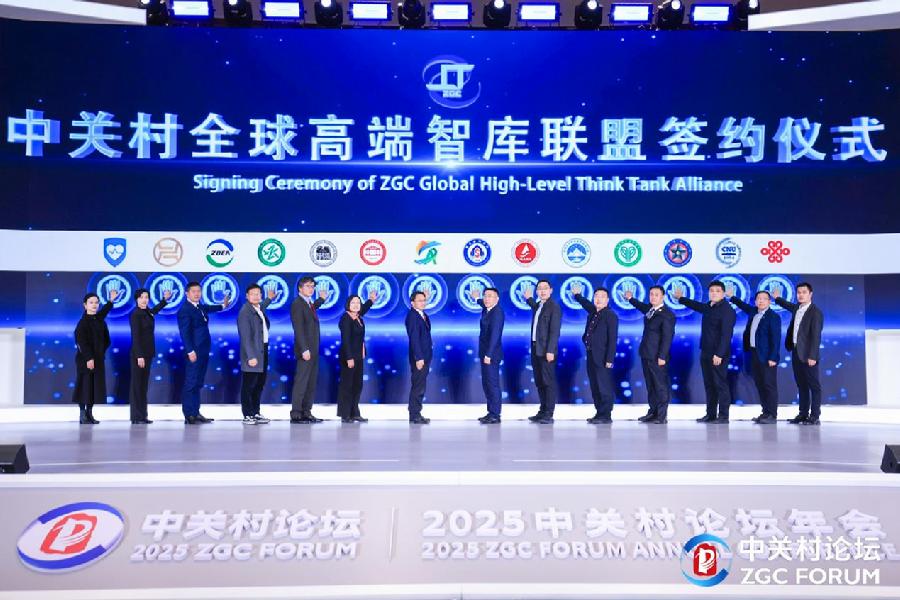
Signing Ceremony Session of ZGC Global High-Level Think Tank Alliance
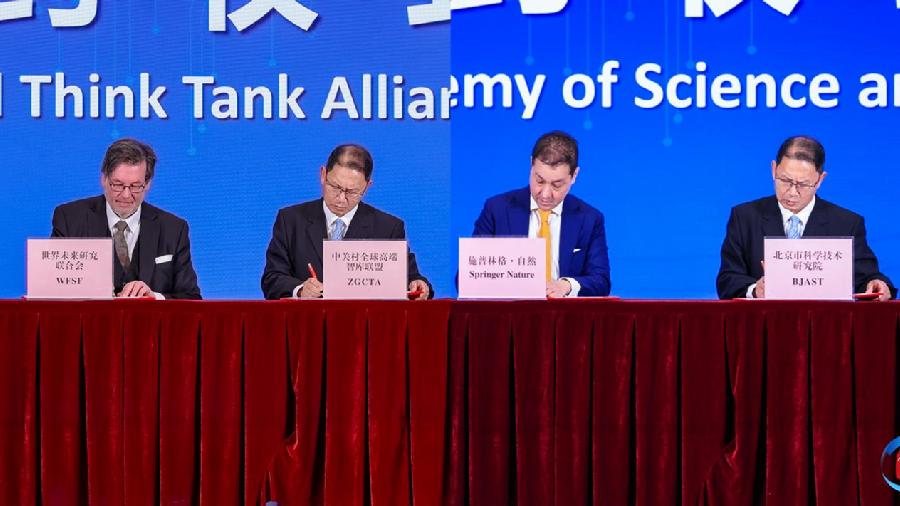
Signing Ceremony Session of ZGC Global High-Level Think Tank Alliance for International and Regional Cooperation
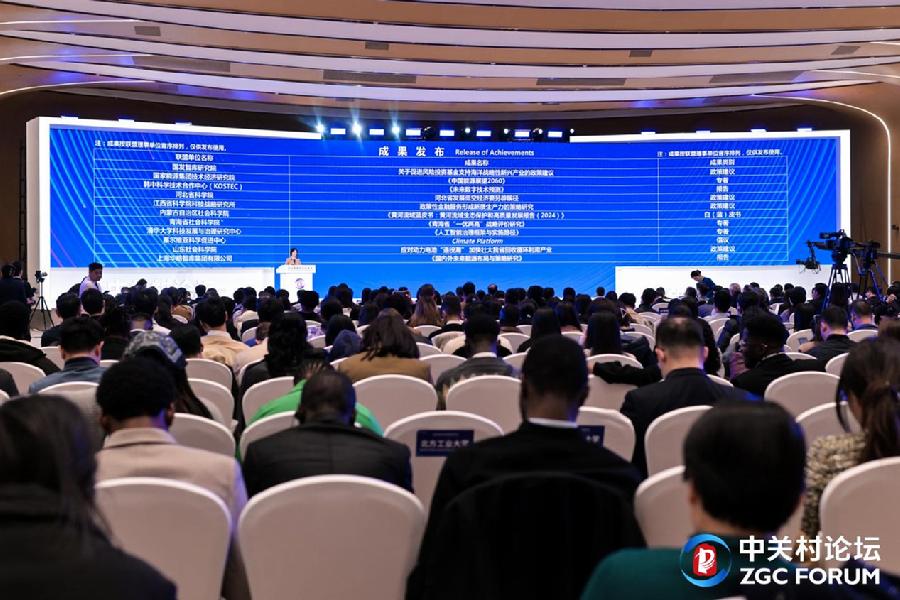
ZGC Global High-Level Think Tank Alliance Results Release Session
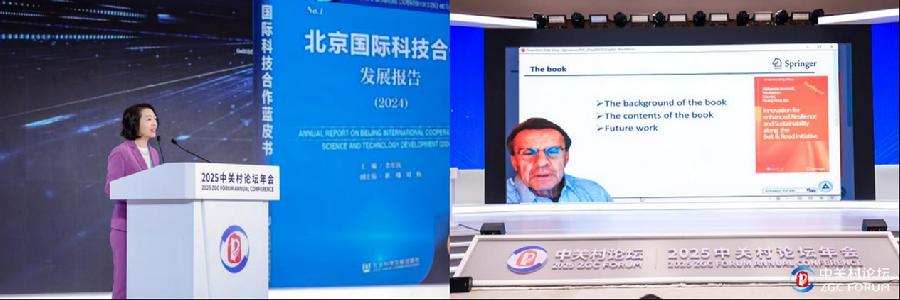
New Book Release and Introduction Session
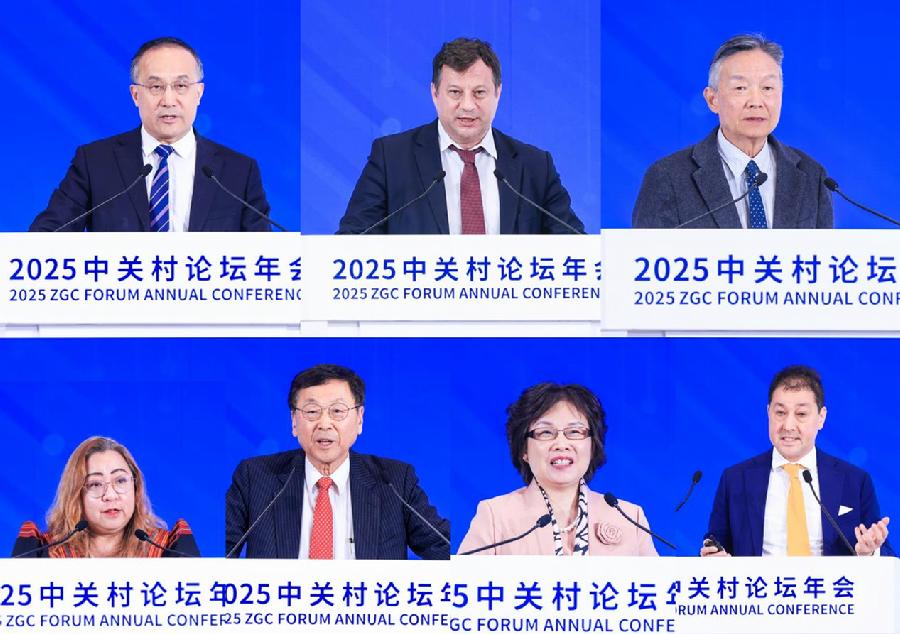
Keynote Report Session
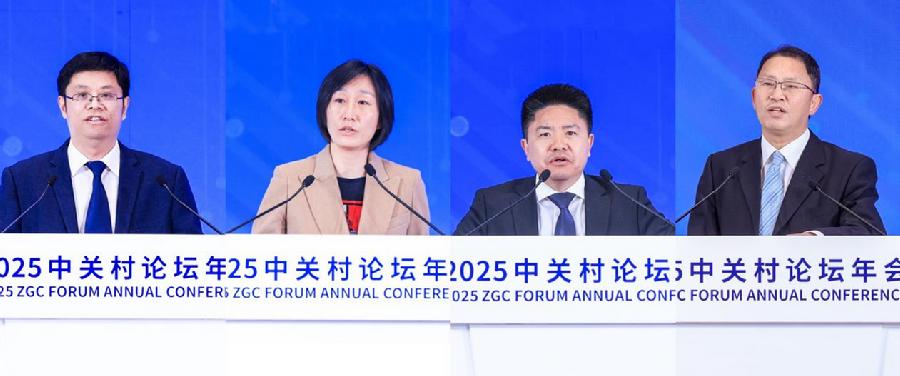
Host and Concluding Session
On March 28, the Global High-Level Think Tank Forum for Science and Technology Innovation (referred to as the "Think Tank Forum") was grandly held at the Zhongguancun International Innovation Center. The Think Tank Forum, with the theme of "Future Industries and Innovation Ecosystem: Voice of Global Think Tanks", invited 4 domestic and foreign academicians, 1 ambassador to China, 3 representatives of international organizations, 95 domestic and foreign high-level think tanks, and more than 500 people from more than 50 countries and regions to participate in the event.
The Think Tank Forum includes seven sessions: opening speech, diplomat’s speech, signing ceremony of ZGC Global High-level Think Tank Alliance (hereinafter referred to as “Think Tank Alliance”), results release of think tank alliance, release and introduction of new books, keynote report and concluding speech.
In the opening speech, Liu Hui, Secretary of the Party Leadership Group of Beijing Academy of Science and Technology (hereinafter referred to as "BJAST"), member and deputy director(concurrently) of the Party Leadership Group of Beijing Municipal Science & Technology Commission, Administrative Commission of Zhongguancun Science Park, pointed out that as an international science and technology innovation center, Beijing has built a full-chain innovation ecosystem, with institutional innovation as its engine and future industries as its breakthrough. He hopes that think tank experts, scientists and entrepreneurs will have in-depth exchanges and build consensus, provide more forward-looking and strategic suggestions for the development of future industries and innovation ecosystems, and promote global sharing of scientific and technological innovation results. Erik F. Øverland, president of the World Futures Studies Federation, pointed out that the pace of scientific and technological innovation is becoming increasingly rapid, and the wave of technological change is sweeping the world with unprecedented force. He called for working together to build a better future with technological leadership, social equity, environmental friendliness and cultural prosperity. Kang Xiangwu, Deputy Director of the First Department of the Ministry of Science and Technology, attended the event and delivered a speech. Wan Shilin, vice president of the "BJAST", presided over the opening speech, diplomat’s speech and other sessions.
During the diplomat’s speech session, Matthew Moody, Minister-Counselor for Innovation at the British Embassy in China, pointed out that only through international cooperation can we obtain the best and most complete research evidence and analysis, and thus provide the best solutions to global challenges. He hopes to use the think tank forum to learn from others and jointly respond to the challenges and opportunities facing the world.
During the signing session, a signing ceremony for the ZGC Global High-Level Think Tank Alliance was held. In 2024, 23 high-level think tanks from eight countries including China, Brazil, India, Italy, Japan, Nepal, Serbia and Spain officially became the council members of the Think Tank Alliance. Representatives from 14 council units attended the signing ceremony for the new think tank alliance council units. The member units that were not present also expressed their joy at joining the think tank alliance and their expectations for future cooperation through carefully recorded blessing videos. The Think Tank Alliance has now developed into a non-governmental multilateral exchange and cooperation platform with 95 alliance member units in 16 countries, covering six types: comprehensive think tanks, science and technology think tanks, economic think tanks, industry think tanks, publishing and media think tanks, and corporate think tanks. The Think Tank Alliance is committed to promoting in-depth cross-border and cross-field cooperation, and achieving mutual benefit and win-win results with international organizations and other institutions through resource sharing, complementary advantages and collaborative innovation. At the signing ceremony of the Think Tank Alliance for international and regional cooperation, the Think Tank Alliance and the World Futures Studies Federation signed a strategic cooperation agreement. Meanwhile, the "BJAST", the chairman unit, and Springer Nature, the vice Director-General unit of the think tank alliance, signed a letter of intent for cooperation on the publication of a new book. Wu Jianmin, Chairman of the Think Tank Alliance and President of the "BJAST", Mr. Eric F. Overland, Arnout Jacobs, President of Springer Nature China, and other representatives attended the signing ceremony.
During the results release session, Gan Quan, deputy director of the Institutes of Science and Development, Chinese Academy of Sciences, released 40 outstanding achievements of think tank alliance council units including the "BJAST", the Institute of Technology and Economics, CHN Energy, Center for Science & Technology Development and Governance, Tsinghua University, the "KOSTEC", the Shanghai Academy of Social Sciences, the Party School of the CPC Central Committee (National Academy of Governance) and Guangdong Sanding Technology Group Co., Ltd.
During the new book release and introduction session, Li Junkai, Secretary-General of the Think Tank Alliance and Director of the Center for International and Regional Cooperation of "BJAST", released the country’s first blue book on international scientific and technological cooperation - "Beijing International Science and Technology Cooperation Development Report (2024)". The book clearly defines the connotation and form of international scientific and technological cooperation. At the same time, through detailed data and rich cases, it systematically sorts out the development status and future trends of Beijing's international scientific and technological cooperation, and puts forward key points, action paths and policy recommendations for the future development of Beijing's international scientific and technological cooperation. Aleksandar JOVANOVI, honorary advisor of the Think Tank Alliance and CEO of the Steinbeis European Institute for Integrated Risk Management, introduced the "Innovation for enhanced Resilience and Sustainability along the Belt & Road Initiative through a video. The book focuses on the innovation for resilience and sustainability in countries and regions along the Belt and Road Initiative, and brings together research results from experts and scholars from 16 countries.
In the keynote report session, seven experts, including Zhang Tao, academician of the Chinese Academy of Sciences and chairman of the Beijing Municipal Advisory Committee on Science and Technology Strategy and Decision-making; Nenad Filipovic, director of the Science Fund of the Republic of Serbia, former president and professor of the University of Kragujevac; Qiu Baoxing, academician of the International Eurasian Academy of Sciences, expert member of the Municipal Advisory Committee on Science and Technology Strategy and Decision-making and former vice minister of the Ministry of Housing and Urban-Rural Development; Jocelle Batapa-Sigue, deputy minister of the DICT of the Philippines for information and communications technology industry development; Jin Hyung Kim, academician of the Korean Academy of Science & Technology and the Korean Academy of Engineering; Fu Xiaolan, academician of the British Academy of Social Sciences and the first Chinese tenured professor in the field of social sciences at the University of Oxford, and Annojie, president of Springer Nature China, delivered keynote speeches respectively. Focusing on the current trend of rapid evolution of global scientific and technological innovation, they had an in-depth discussion on the challenges and opportunities brought about by new trends in future industrial development, as well as the establishment and development of a new paradigm for the scientific and technological innovation ecosystem. This session was hosted by Huang Qi, President of the Chinese Academy of Science and Technology for Development.
With the topic of "Zero-Carbon Blueprint: Future Industrial Reconstruction and Innovation Ecology under the Goal of Carbon Neutrality", Zhang Tao introduced the key strategies for future industrial reconstruction and innovation ecology under the goal of carbon neutrality, and pointed out that green technology is an important driving force for achieving carbon neutrality, especially in the fields of renewable energy, energy storage and carbon capture, which will be the core means to achieve carbon neutrality.
Nenad Filipovic conducted an in-depth discussion on the concept of digital twins and its application in urban planning and climate action, and analyzed the important role in promoting fairness in climate action and enhancing urban resilience, with the topic of "Digital Twins Promote the Development of Innovation Ecosystem".
With the topic of "Optimizing the Sci-tech Innovation Ecosystem and Enhancing the Vitality of Urban Sci-tech Innovation", Qiu Baoxing clarified how to enhance the vitality of urban scientific and technological innovation by optimizing the innovation ecosystem. He stressed that cities should create a high-quality business and living environment, attract talents, promote the transformation of innovative achievements, and promote the growth of private small and medium-sized enterprises to achieve sustained prosperity in scientific and technological innovation.
Jocelle Batapa-Sigue introduced the role of startups in the Philippine innovation ecosystem with the topic of “Philippine Innovation Ecosystem: How Startups Drive Economic Growth and Promote Digital Inclusion’. She pointed out that start-ups in areas such as artificial intelligence, the Internet of Things and financial technology have not only promoted the development of emerging industries, but also attracted a lot of investment and global cooperation. She believes that government policies and strategic intervention are important guarantees for the healthy development of start-ups.
Jin Zhenheng conducted an in-depth discussion about the potential and challenges of AI chatbots with the title "How will AI chatbots develop in the future?" He pointed out that AI chatbots have a wide range of applications and will play an important role in scientific research, educational guidance, and medical care, but they can still generate inaccurate or misleading information when performing complex tasks. He believes that in order to promote the long-term development of AI chatbots, the design and application links need to achieve the dual goals of sustainability and responsibility.
With the topic of "Turning the Invisible into the Visible: AI Helps to Connect the Technology-Talent-Capital-Industry Innovation Chain", Fu Xiaolan analyzed in detail how to build an innovation ecosystem by connecting technology, talent, capital and industrial innovation chains through AI technology. She pointed out that AI can not only improve the efficiency of industrial transformation and upgrading by optimizing resource allocation and innovation mechanisms in all aspects, but also help enterprises and scientific research institutions improve their innovation efficiency and promote the comprehensive development of the economy and society.
In Annojie's speech entitled "Open Science Supports and Accelerates Innovation", he pointed out that the development of open science is inseparable from policy support, international cooperation and the active participation of scientific researchers. By establishing a sound data sharing infrastructure, formulating reasonable incentive mechanisms and promoting fair rules, we can accelerate scientific research innovation, allow scientific research results to benefit a wider audience, and ultimately make a greater contribution to solving global challenges.
In the concluding speech, Wu Jianmin stressed that there are three characteristics in this think tank forum: first, based on the forefront and jointly draw a blueprint for the future; second, open and collaborative, build global consensus; and third, pragmatic and cooperative, deepened the win-win mechanism. He said that the think tank alliance will continue to play the role of a bridge and a link, connecting the wisdom and strength of think tank institutions and contributing the power of think tanks to promoting the building of a community with a shared future for mankind!
The Global High-Level Think Tank Forum for Science and Technology Innovation is one of the top ten brand forums of the Zhongguancun Forum. It is hosted by the Ministry of Science and Technology and the Beijing Municipal People's Government, and presented by the Beijing Academy of Science and Technology, the ZGC Global High-level Think Tank Alliance, Institutes of Science and Development, Chinese Academy of Sciences, and the World Futures Studies Federation, and co-organized by the Institute of Technology and Economics, CHN Energy, Capital Normal University, and the Beijing Innovation Alliance. The think tank forum also received strong support from media such as Guangming Online, Kuaishou, China Business Journal and Workers’ Daily Online.
